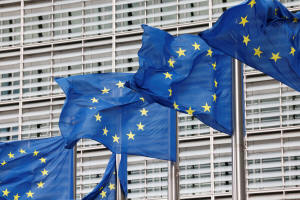EU to discuss coordinated response to China COVID situation on Wed
 Send a link to a friend
Send a link to a friend
 [January 03, 2023]
BRUSSELS (Reuters) - European Union government health officials
will hold talks on Wednesday on a coordinated response to the surge in
COVID-19 infections in China, the Swedish EU presidency said on Monday,
after December talks concluded with no decisions on the matter. [January 03, 2023]
BRUSSELS (Reuters) - European Union government health officials
will hold talks on Wednesday on a coordinated response to the surge in
COVID-19 infections in China, the Swedish EU presidency said on Monday,
after December talks concluded with no decisions on the matter.
At a similar meeting on Dec. 29, held online among over 100
representatives from EU governments, EU health agencies and the World
Health Organisation, Italy urged the rest of the EU to follow its lead
and test travellers from China for COVID, with Beijing poised to lift
travel restrictions on Jan. 8.
But others in the 27-nation EU said they saw no need to do so despite
China's decision to loosen its pandemic restrictions amid a wave of new
infections.
"There is a scheduled Integrated Political Crisis Response meeting on
Wednesday, January 4, for an update of the COVID-19 situation in China
and to discuss possible EU measures to be taken in a coordinated way," a
spokeswoman for the Swedish presidency of the EU said.
The European Health Commissioner Stella Kyriakides said in a letter to
EU governments on Dec. 29 they should consider immediately scaling up
genomic sequencing of COVID-19 infections and monitoring of waste water,
including at airports, to detect any new variants, given the surge in
infections in China.
[to top of second column]
|

European Union flags flutter outside the
EU Commission headquarters in Brussels, Belgium, September 28, 2022.
REUTERS/Yves Herman/File Photo
 Kyriakides said the bloc should be
"very vigilant" as reliable epidemiological and testing data for
China were scarce, advising EU health ministers to assess their
current practices on genomic sequencing of the coronavirus "as an
immediate step".
The European Centre for Disease Prevention and Control said last
week it did not currently recommend measures on travellers from
China.
It said the variants circulating in China were already in the
European Union, that EU citizens had relatively high vaccination
levels and the potential for imported infections was low compared to
daily infections in the EU, with healthcare systems currently
coping.
(Reporting by Jan Strupczewski; Editing by Bernadette Baum)
[© 2023 Thomson Reuters. All rights
reserved.]This material may not be published,
broadcast, rewritten or redistributed.
Thompson Reuters is solely responsible for this content. |